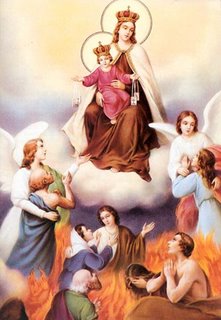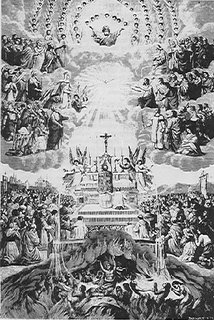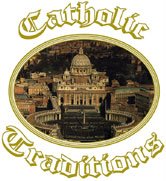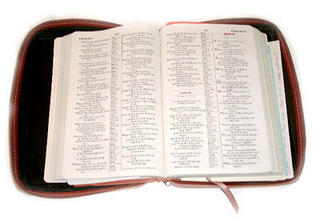
There are very few amongst us who live lives of such holiness and purity that we can enter Heaven immediately upon our death, therefore if we have not reached that level of holiness what becomes of the soul? This does not mean that Heaven is out of reach for those who love God and have tried their utmost to follow the Commandments of God and the tenets of our Faith, but what if we have not reached perfect conformity to Gods Will?
In order for God to show His infinite Mercy to all, we have the existence of Purgatory, which is not a punishment but is simply Gods Justice to those who have failed to live in full conformity to Gods Will. Each of us have opportunities to live Gods Will as directed by Holy Scripture and the Teachings of the Catholic Church, but very few follow the Teachings that will help us to live holy and pure lives. Therefore because we failed to live in conformity to Gods Will on earth, we need to be able to expiate our sins that have accumulated in our lives through neglect rather than outright disobedience.
For each of us to enter Heaven we must do so in a state of purity and perfection, but because of our imperfect souls and disordered choices that we have made through our own free will, we need a place or an existence where our imperfections can be purified through the all consuming Fire of Gods Just Love. Though Jesus Atoned for our sins so that all men should be saved, this does not mean that we have a free ticket into Heaven merely because we believe in God, we must also live what we believe or we have failed to live as God Commands each of us. In all cases and to all individuals we shall be held accountable for all our thoughts and words, for God is not only Merciful He is also Just. It is in Purgatory that both Mercy and Divine Justice collaborate to purify the souls incompleteness and imperfections.
As the Church teaches in the Catechism, "All who die in God's grace and friendship, but still imperfectly purified, are indeed assured of their eternal salvation; but after death they undergo purification, so as to achieve the holiness necessary to enter the joy of heaven...The Church gives the name Purgatory to this final purification of the elect. which is entirely different from the punishment of the damned. The Church formulated her doctrine of faith on Purgatory especially at the Councils of Florence and Trent." Also Holy Scripture instructs the faithful, "May he draw our hearts to himself, that we may follow him in everything and keep the commands, statutes, and ordinances which he enjoined on our fathers. May this prayer I have offered to the LORD, our God, be present to him day and night, that he may uphold the cause of his servant and of his people Israel as each day requires, May this prayer I have offered to the LORD, our God, be present to him day and night, that he may uphold the cause of his servant and of his people Israel as each day requires, that all the peoples of the earth may know the LORD is God and there is no other. You must be wholly devoted to the LORD, our God, observing his statutes and keeping his commandments, as on this day." Which teaches us all that in order to live in Gods favour we must live lives of obedience to Gods Word or suffer the consequences through our own lack of love and not a lack of Gods Love which is infinite. As the Scripture instructs for those who may die before the soul has obtained this level of obedience and conformity to Gods Will, "Turning to supplication, they prayed that the sinful deed might be fully blotted out. The noble Judas warned the soldiers to keep themselves free from sin, for they had seen with their own eyes what had happened because of the sin of those who had fallen. He then took up a collection among all his soldiers, amounting to two thousand silver drachmas, which he sent to Jerusalem to provide for an expiatory sacrifice. In doing this he acted in a very excellent and noble way, inasmuch as he had the resurrection of the dead in view; for if he were not expecting the fallen to rise again, it would have been useless and foolish to pray for them in death. But if he did this with a view to the splendid reward that awaits those who had gone to rest in godliness, it was a holy and pious thought. Thus he made atonement for the dead that they might be freed from this sin."
We see in Scripture that Purgatory exists, for if a soul immediately enters Heaven upon their earthly death, they are then not in need of your prayers for they have reached the Beatific Vision. Whereas the soul who has rejected Jesus Salvific Sacrifice and in full knowledge does not repent of their sins shall enter eternal damnation where no amount of prayer will help them. This is shown to us in Scripture, "There was a rich man who dressed in purple garments and fine linen and dined sumptuously each day. And lying at his door was a poor man named Lazarus, covered with sores, who would gladly have eaten his fill of the scraps that fell from the rich man's table. Dogs even used to come and lick his sores. When the poor man died, he was carried away by angels to the bosom of Abraham. The rich man also died and was buried, and from the netherworld, where he was in torment, he raised his eyes and saw Abraham far off and Lazarus at his side. And he cried out, 'Father Abraham, have pity on me. Send Lazarus to dip the tip of his finger in water and cool my tongue, for I am suffering torment in these flames.' Abraham replied, 'My child, remember that you received what was good during your lifetime while Lazarus likewise received what was bad; but now he is comforted here, whereas you are tormented...He said, 'Then I beg you, father, send him to my father's house, for I have five brothers, so that he may warn them, lest they too come to this place of torment.' But Abraham replied, 'They have Moses and the prophets. Let them listen to them.' He said, 'Oh no, father Abraham, but if someone from the dead goes to them, they will repent.' Then Abraham said, 'If they will not listen to Moses and the prophets, neither will they be persuaded if someone should rise from the dead.' As we are instructed once the soul has died the opportunity to repent has been eternally lost, this should warn us all not to presume on the Goodness of God and fail to follow His Commandments. For those who believe that the Old Testament is no longer relevant we have Pauls teaching as he instructs the faithful, "If the work which any man has built on the foundation [which is Christ] survives, he will receive a reward. If any man's work is burned up, he will suffer loss, though he himself will be saved, but only as through fire"
For those who have failed to conform their lives to Gods Will what can those who are still living do to assist these holy souls who are undergoing the Purgative Way? The Saints instruct us through their words on what Purgatory is and how the living can assist those who suffer the consequences of their earthly actions. St. Augustine describes Purgatory in these words, "Though this fire is destined to cleanse and purify the soul, " adds the Holy Doctor, "still it is more acute than anything we could possibly endure on Earth. " St Cyril of Alexandria continues in the same vein, "it would be preferable to suffer all the possible torments of Earth until the Judgment day than to pass one day in Purgatory. " Blessed Anne Catherine Emmerich also explained in this way what she had seen and been told by our Lord and Lady, "She saw how the various indulgences we gain actually remit specific punishments which otherwise would await us in Purgatory. She revealed that to gain an indulgence we must approach the Sacraments with true repentance and a firm purpose of amendment--or we do not gain it. She deposes that it is more holy to pray for the Poor Souls in Purgatory than for sinners who are still alive. She describes the nature, extent and power of victim souls, and their role in the life of the Church....She revealed that saints are particularly powerful on their feast days and should be invoked then. She saw that many saints come from the same families, the antiquity of which often extends far back into the Old Testament. She saw the strong link--even long after their deaths--between holy souls in Heaven and their descendants here on earth, lasting even centuries." Anne Catherine also confided to her spiritual director that the souls who spend the most time in Purgatory are our Protestant brothers and sisters, NOT because they were more sinful but that VERY few are praying for them and NO Masses are offered for the repose of their soul.
We also have the works of that great Saint John Vianney who explains Purgatory and how we can assist the suffering souls in this manner, "Ah! I come on behalf of God Himself. I come on behalf of your poor parents, to awaken in you that love and gratitude which you owe them. I come to bring before your minds again all those kindnesses and all the love which they gave you while they were on earth. I come to tell you that they suffer in Purgatory, that they weep, and that they demand with urgent cries the help of your prayers and your good works. I seem to hear them crying from the depths of those fires which devour them: "Tell our loved ones, tell our children, tell all our relatives how great the evils are which they are making us suffer. We throw ourselves at their feet to implore the help of their prayers. Ah! Tell them that since we have been separated from them, we have been here burning in the flames! Oh! Who would be so indifferent to such sufferings as we are enduring?" Do you see, my dear brethren, do you hear that tender mother, that devoted father, and all those relatives who helped and tended you? "My friends," they cry, "free us from these pains; you can do it." Consider then, my dear brethren: (a) the magnitude of these sufferings which the souls in Purgatory endure; and (b) the means which we have of mitigating them: our prayers, our good works, and, above all, the holy sacrifice of the Mass." With these words St. John Vianney reminds us that we are the only hope for those poor souls suffering in the Purgative Way who grieve the loss of being united with their Beloved for eternity in Heaven.
We have the words of St. Ambrose who said, 'No day shall pass you over in silence, no prayer of mine shall ever be closed without remembering you. No night shall pass you over without some vows of my supplications. You shall have share in all my sacrifices. If I forget you (now that you are dead) let my own right hand be forgotten" Such was his longing to help these holy souls attain Heaven. There is also St. Catherine of Genoa who explained Purgatory in this way, "No tongue can express, no mind can understand, how dreadful is Purgatory?And be assured that the souls have to pay what they owe even to the last farthing. This is Gods decree to satisfy the demands of justice." This complies with the Churches Teaching that what is not fully atoned in this life will be atoned by the Purgative Way in the after life. We must also not fall into favouring Purgatory rather than try to live our lives by obeying Gods Commandments and the Church's Teaching as if this were a favourable negotiation for our unwillingness to abide by Gods Will, for as St. Caesarius of Arles says, "A person may say, I am not much concerned how long I remain in Purgatory, provided 1 may come to eternal life. Let no one reason thus. Purgatory fire will more dreadful than whatever torment can be seen, imagined or endured in this world."
That wonderful Saint Margaret Mary Alacoque confided when she was praying before the Blessed Sacrament, "on the Feast of Corpus Christi a person enveloped in fire suddenly stood before me. From the pitiable state the soul was in I knew it was in Purgatory and I wept bitterly"
So now we understand how much it is encumbered upon all of us to remember these poor souls who languish in this terrible pain through lack of care and attentiveness. May we remember these holy souls during our prayer time and most especially to offer Masses for the repose of their souls. Let us also realise that these holy souls remind us of the consequences when we deliberately choose not to live our Faith with sincerity or refuse through obstinacy to abide with Gods Will, and rather many choose to follow their own whims and fancies. Let us also keep to the fore of our minds not to presume on Gods Mercy, lest we fall into presumption and take Gods Love for granted while deliberately neglecting Gods Justice.
Lastly as we near Easter, let us remind ourselves that the holy souls rely on each of us to aid them in their pain and to help them come to their Heavenly Reward...they have only...YOU. Remember those poor souls in prayer!

Peace of Christ to ALL
Copyright © 2006 Marie Smith. All rights reserved.
Purgatory
Roman Catholic




